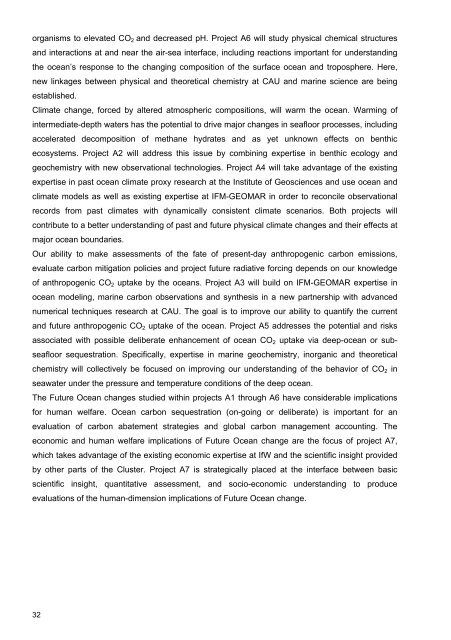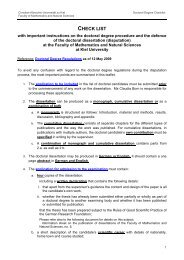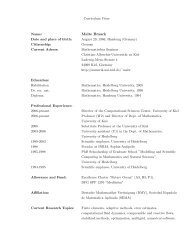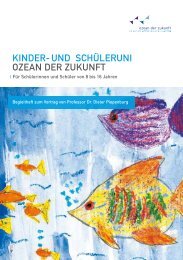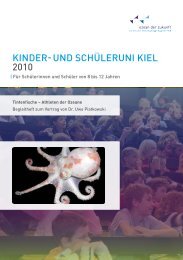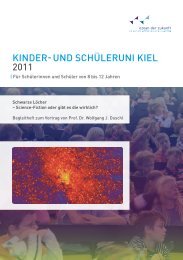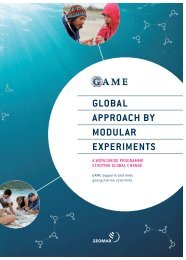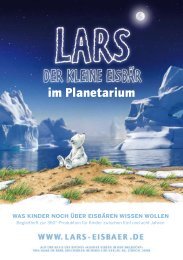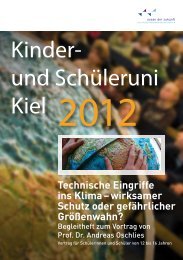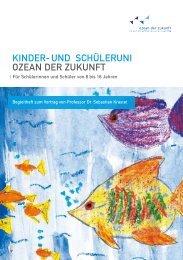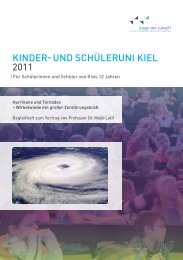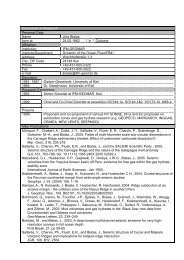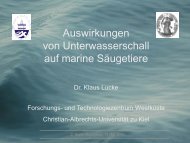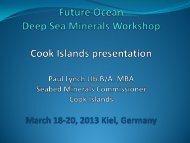Untitled - The Future Ocean
Untitled - The Future Ocean
Untitled - The Future Ocean
- No tags were found...
Create successful ePaper yourself
Turn your PDF publications into a flip-book with our unique Google optimized e-Paper software.
organisms to elevated CO 2 and decreased pH. Project A6 will study physical chemical structuresand interactions at and near the air-sea interface, including reactions important for understandingthe ocean’s response to the changing composition of the surface ocean and troposphere. Here,new linkages between physical and theoretical chemistry at CAU and marine science are beingestablished.Climate change, forced by altered atmospheric compositions, will warm the ocean. Warming ofintermediate-depth waters has the potential to drive major changes in seafloor processes, includingaccelerated decomposition of methane hydrates and as yet unknown effects on benthicecosystems. Project A2 will address this issue by combining expertise in benthic ecology andgeochemistry with new observational technologies. Project A4 will take advantage of the existingexpertise in past ocean climate proxy research at the Institute of Geosciences and use ocean andclimate models as well as existing expertise at IFM-GEOMAR in order to reconcile observationalrecords from past climates with dynamically consistent climate scenarios. Both projects willcontribute to a better understanding of past and future physical climate changes and their effects atmajor ocean boundaries.Our ability to make assessments of the fate of present-day anthropogenic carbon emissions,evaluate carbon mitigation policies and project future radiative forcing depends on our knowledgeof anthropogenic CO 2 uptake by the oceans. Project A3 will build on IFM-GEOMAR expertise inocean modeling, marine carbon observations and synthesis in a new partnership with advancednumerical techniques research at CAU. <strong>The</strong> goal is to improve our ability to quantify the currentand future anthropogenic CO 2 uptake of the ocean. Project A5 addresses the potential and risksassociated with possible deliberate enhancement of ocean CO 2 uptake via deep-ocean or subseafloorsequestration. Specifically, expertise in marine geochemistry, inorganic and theoreticalchemistry will collectively be focused on improving our understanding of the behavior of CO 2 inseawater under the pressure and temperature conditions of the deep ocean.<strong>The</strong> <strong>Future</strong> <strong>Ocean</strong> changes studied within projects A1 through A6 have considerable implicationsfor human welfare. <strong>Ocean</strong> carbon sequestration (on-going or deliberate) is important for anevaluation of carbon abatement strategies and global carbon management accounting. <strong>The</strong>economic and human welfare implications of <strong>Future</strong> <strong>Ocean</strong> change are the focus of project A7,which takes advantage of the existing economic expertise at IfW and the scientific insight providedby other parts of the Cluster. Project A7 is strategically placed at the interface between basicscientific insight, quantitative assessment, and socio-economic understanding to produceevaluations of the human-dimension implications of <strong>Future</strong> <strong>Ocean</strong> change.32


